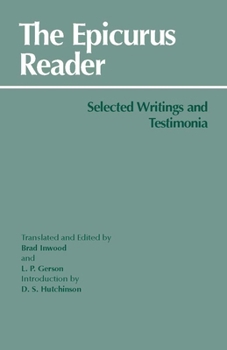The Epicurus Reader: Selected Writings and Testimonia (Hackett Classics)
Select Format
Select Condition 
Book Overview
TABLE OF CONTENTS: Introduction The ancient biography of Epicurus The extant letters Ancient collections of maxims Doxographical reports The testimony of Cicero The testimony of Lucretius The polemic... This description may be from another edition of this product.
Format:Paperback
Language:English
ISBN:0872202410
ISBN13:9780872202412
Release Date:March 1994
Publisher:Hackett Publishing Company, Inc.
Length:128 Pages
Weight:0.52 lbs.
Dimensions:8.3" x 0.3" x 5.5"
Related Subjects
Metaphysics Politics Non-Fiction History & Surveys Philosophy Politics & Social SciencesCustomer Reviews
3 ratings
An excellent, well presented translation
Published by Thriftbooks.com User , 17 years ago
There are many people who believe that Epicurus is the author of the dominant school of philosophy in 21st Century Western Civilization. That might be true. Even though it's unlikely that the average American or Western European knows much about Epicurus, this ancient sage certainly expresses ideas that are held to a certain degree by many people today. Certainly, Epicurus' thoughts were heard again in the writings of many thinkers of the Enlightenment Era, and any student of the late 17th and the 18th Centuries will take great interest in Epicurus' words. This little work could have, in fact, offered readers some passages from more modern philosophers to better help readers connect with Epicurus. I don't regard this as a flaw or fault however. The citations and excerpts from more ancient sources that are in this book are considerable for such a short book. This book delivers what it intends to, the works of Epicurus. This translation is very readable. We don't have a lot of his writings, and this little work conveys what is extant in a language that is approachable. The addition of material excerpted from other sources is also well done, if not presented extensively enough. An informative but much too enthusiastic introduction, one that turns into something of an endorsement, by D. S. Hutchinson should be read with respectful reservation. Do read carefully the many detractors of Epicureanism. Cicero's Nature of the Gods is a forceful response of great power not conveyed in this little volume's excerpts of that great work. The Stoics and Christians both fiercely rejected Epicurus' philosophy while generally agreeing that he was himself a man of great virtue and character. Plutarch, as the introduction also mentions, was also a harsh critic. So why did Epicurus' ideas receive so much bad press? Please do find out why.
An Eye Opener about Living with Eyes Open
Published by Thriftbooks.com User , 26 years ago
Let me say at the outset that Epicurus is hard to understand because we have only fragments of his work. Epicurus is important to people living in the third millenium because he realized, as most of us do, that traditional religion is not very believable. In his time the Hellenistic and Roman world was about to fall into a morass of Eastern religions, spiritualism, and superstition familiar to third millenium people living amid Tibetan and Zen Buddhism, Wicca, and New Age. Epicurus has two huge virtues that make him worth reading even now. He is ferociously smart for one. Some of his insights about physical phenomena millenia before the invention of real scientific instruments are astonishing. The other is that he is unrelentingly honest and rigorous. His premise is that we only know what we can find out from our senses and our reason. This is immensely liberating from all the causistry, tradition, authority, and sentiment of both culture and counter-culture. To the ultimate rationalization for religion, "Well, it is a comfort for the simple." he responds, "Truth and honesty are better than comfort." He dismissed death as nothing, and proved his point by showing legendary courage in facing his own.
An Eye Opener about living with Eyes Open
Published by Thriftbooks.com User , 26 years ago
Let me say at the outset that Epicurus is hard to understand because we have only fragments of his work.Epicurus is important to people living in the third millenium because he realized, as most of us do, that traditional religion is not very believable.In his time the Hellenistic and Roman world was about to fall into a morass of Eastern religions, spiritualism, and superstition familiar to third millenium people living amid Tibetan and Zen Buddhism, Wicca, and New Age.Epicurus has two huge virtues that make him worth reading even now.He is ferociously smart for one. Some of his insights about physical phenomena millenia before the invention of real scientific instruments are astonishing. The other is that he is unrelentingly honest and rigorous. His premise is that we only know what we can find out from our senses and our reason. This is immensely liberating from all the causistry, tradition, authority, and sentiment of both culture and counter-culture.To the ultimate rationalization for religion, "Well, it is a comfort for the simple." he responds, "Truth and honesty are better than comfort." He dismissed death as nothing, and proved his point by showing legendary courage in facing his own.





